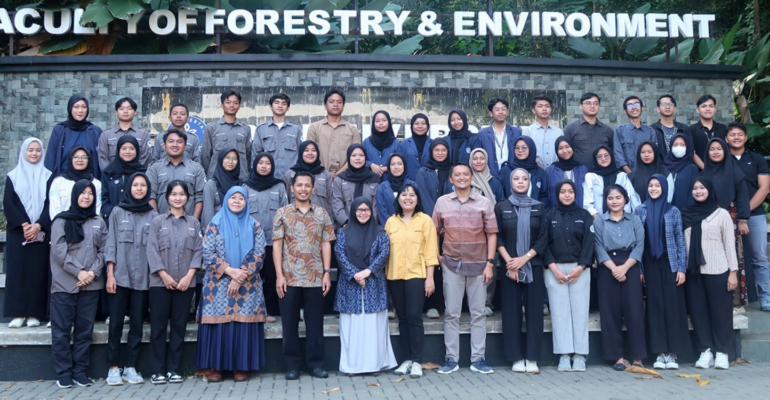Make a New Breakthrough, Himakova’s PPK Ormawa Team Launches Low Carbon Tourism in Wirajaya Village

Tourism development can potentially increase the number of visits which have an impact on the addition of carbon emissions from transportation and tourism activities themselves. For this reason, the Student Association of Forest Resource Conservation (Himakova) IPB University made a breakthrough.
IPB University students created a new innovation in the form of a tourism program designed to reduce the carbon footprint. This program is named ‘Low Carbon Tourism’ which aims to create more sustainable tourism.
This program was implemented as part of the implementation of the Student Organization Capacity Strengthening Program (PPK Ormawa) initiated by the Ministry of Education, Culture, Research and Technology (Kemendikbudristek).
“This is a new breakthrough that has the potential to be developed in Indonesia. Until now, there has been no tourism that applies a unique concept of low carbon emissions, so you can be the first initiator in Indonesia and even in the world,” said Ir Mintarti, MSi, the reviewer team of Semarak Bina Desa Mahasiswa during the enrichment program with the PPK Ormawa Himakova team in the Sylva Conference Room, IPB Dramaga Campus.
In the meeting, Mintarti revealed that the concept of low-carbon tourism that was carried out could be a pioneer for tourism in Indonesia in applying sustainable and environmentally responsible principles.
Dr Eva Rachmawati, associate lecturer of the PPK Ormawa team explained that efforts to reduce carbon emissions in this program are by reducing the source of carbon emissions and increasing the absorption of carbon produced.
“Efforts to reduce carbon emission sources are carried out by sustainable waste management, designing low-carbon tourism activities, and implementing standard operating procedures (SOP) for visits that minimize waste,” she explained.
Meanwhile, efforts to increase carbon absorption are carried out by planting various types of plants that have the ability to absorb large carbon.
“Seeing the potential beauty of Wirajaya Village and the suitability of our knowledge, we are excited and optimistic in building an interesting and different tourism concept from tourism in general,” added Fatin Hanifah as the head of the PPK Ormawa Himakova team.
Fatin explained that the development of low carbon tourism will be realized through several programs, namely Wiranger’s School in the form of a medium for community training to become tourism managers who apply low carbon principles, Witari (Wirajaya Taman Asri) in the form of providing parks with various low carbon facilities made from domestic and palm oil waste, Wirasi (Wirajaya Berkreasi) in the form of making tourism products from palm oil waste creations, and Widaya (Wirajaya Berbudaya) in the form of low carbon local cultural performances as a form of conservation strategy in a cultural perspective.
The implementation of this activity from June to November aims to produce a low-carbon tourism village as a new destination in Indonesia. The program is also expected to increase tourism attraction in Wirajaya Village through low-carbon tourism attractions and products.
“The existence of this program is also part of human resource empowerment that can optimize tourism management in various aspects with the participation of Wirajaya Village stakeholders,” he concluded. (*/Rz) (IAAS/Aly)



